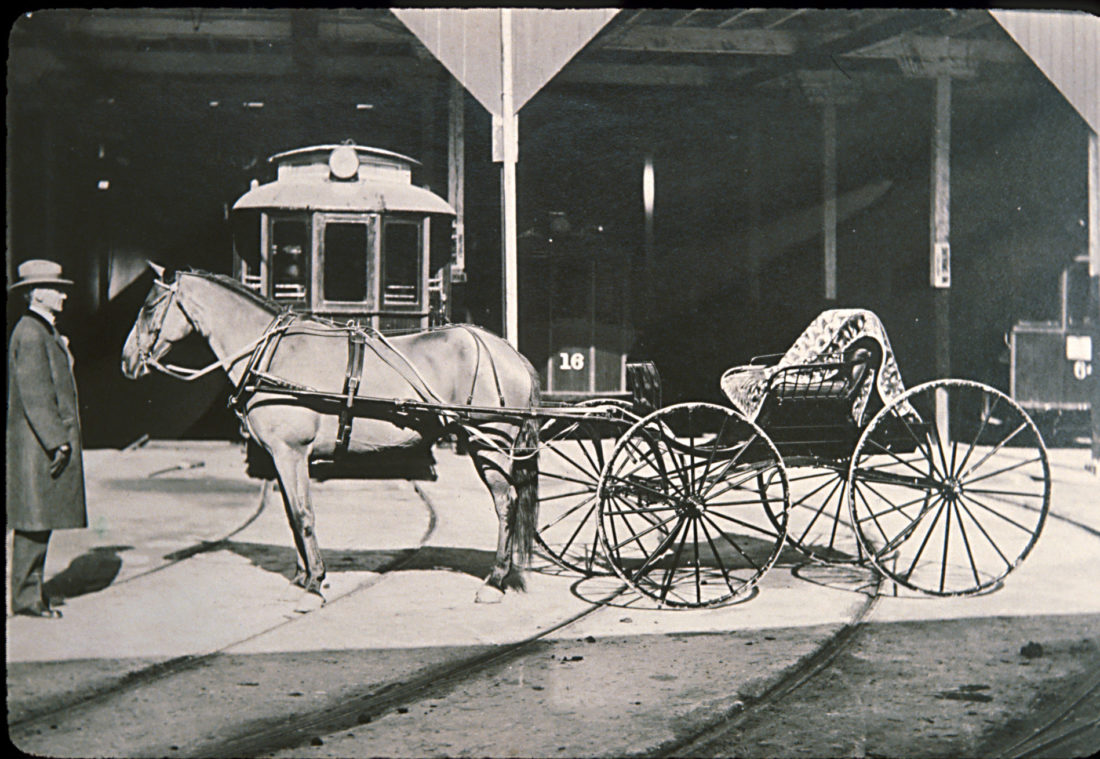On April 26, 1913, at 11:45 a.m., the city’s streetcars unexpectedly headed back to the station. By noon, “every car was in the barn,” reported The Asheville Gazette News in the paper’s afternoon edition. Shortly thereafter, the conductors were on the street: A strike over wages was officially underway.
Despite the measure, the newspaper assured readers that those protesting the Asheville Power and Light Co. had “no intention of conducting anything other than an orderly strike.”
Unfortunately, not everyone who supported the union members’ cause agreed with the group’s peaceful approach. The following day’s paper reported that “a crowd of mischievous boys and young men cut the trolley rope on a car,” when Asheville Power and Light Co. replaced strikers with office staff. According to the article, the substitute driver “climbed on top of the car, held the trolley against the wire with his hands, and so proceeded to the barn.”
Because of the incident, services shutdown early Saturday night and remained discontinued that Sunday. This hiccup was temporary, promised general manager Harry Plummer. “The cars will run,” he proclaimed in a statement published in The Sunday Citizen. “This is a duty we owe the public, and that duty will be fulfilled.”
Meanwhile, other residents capitalized on the dearth of transportation options. In that same day’s paper, The Sunday Citizen reported:
“It was a great day and a still greater night for the ‘cabbies.’ Dilapidated vehicles that looked as if they had last seen service during the Civil War, were resurrected from their peaceful resting places, and, attached to horses that had only escaped the humane officer by a miracle[.]”
Despite the antiquated mode of transportation, cab fare was steep — between a quarter and a half-dollar per ride versus the required nickel to take the trolley. The financial impact was immediate. Saturday night shoppers were noticeably absent from downtown, The Sunday Citizen declared. “Crowds on the street were mostly composed of the sterner sex, wishing themselves at home, but afraid that they would miss something were they to leave.”
Anticipated community unrest, however, would not surface until the following day, when 21 strikebreakers were brought in to drive the streetcars. The out-of-town men were briefly housed at the Langren Hotel (see “Asheville Archives: The Langren Hotel brings the latest amenities to the city, 1912,” Jan. 16, 2018, Xpress), where an angry mob quickly formed in protest.
The Asheville Citizen estimated a crowd of 2,000 formed outside the hotel, “shouting and jeering at the strike-breakers, and daring them to come forth and show themselves, promising all sorts of unpleasant things in case the men within complied with the demands.”
According to the paper, the 21 men were whisked away to the Southern Railroad depot, where they caught the 7 p.m. eastbound train. “Heroic work on the part of the members of the Asheville police department alone prevented the storming of the hotel,” the paper reported.
The final days of April passed without additional conflict. Armed guards accompanied subsequent strikebreakers on their daily rides. Meanwhile, the newspaper, civic leaders and union members all expressed the same desire to quell further violence while in pursuit of a resolution. But as the strike continued, the message ultimately fell on deaf ears.
On May 1, 1913, The Asheville Citizen wrote:
“Under cover of the darkness, a mob composed of about two hundred young men and boys gathered on Ashland avenue last night, and gave vent to their feelings against the strike-breakers lodged in the building of the Asheville Power and Light company, by hurling bricks and other missiles against the sides of the building, practically demolishing all the windows on the lower end of the building.”
At one point during the night, shots were fired from inside the Asheville Power and Light building. “The effect on the crowd was instantaneous,” the paper reported. “Some of those who had been making the loudest talk, and doing most of the yelling, were the first to put distance between themselves and any possible danger.”
Seven people were arrested that evening.
In a public statement, local union President Z.C. Fisher denounced the violence. Within the address, he also directly outlined the union’s grievances. “[T]he cost of living in Asheville has increased at least 40 per cent within the last seven years,” he declared. Meanwhile, “[T]he wages of the street car men in the city of Asheville have been increased only 1 ½ cent per four in the seven years mentioned.”
That evening, an estimated 1,800 citizens gathered at the city auditorium to address the matter. A resolution was adopted, calling for arbitration between the two parties. The following day, the matter was resolved. New rates were agreed upon, increasing pay from 17-21 cents to 19-25 cents.
Fisher offered his thoughts on the settlement in that day’s paper, stating there had never been “the slightest ill will between the company officials and the men.” Later he added, “We will start to work tomorrow morning, every man pledged to give the same unswerving loyalty, the same conscientiousness and the same hard work that has always characterized our relations to the company[.]”
Editor’s note: Peculiarities of spelling and punctuation are preserved from the original documents.




Before you comment
The comments section is here to provide a platform for civil dialogue on the issues we face together as a local community. Xpress is committed to offering this platform for all voices, but when the tone of the discussion gets nasty or strays off topic, we believe many people choose not to participate. Xpress editors are determined to moderate comments to ensure a constructive interchange is maintained. All comments judged not to be in keeping with the spirit of civil discourse will be removed and repeat violators will be banned. See here for our terms of service. Thank you for being part of this effort to promote respectful discussion.